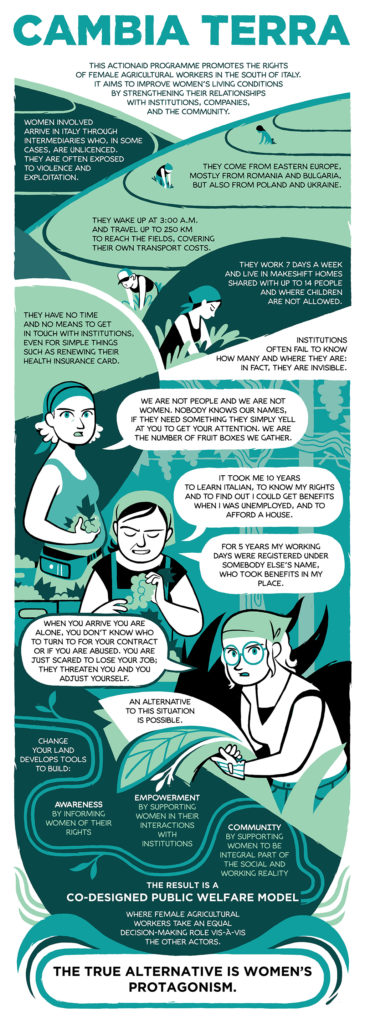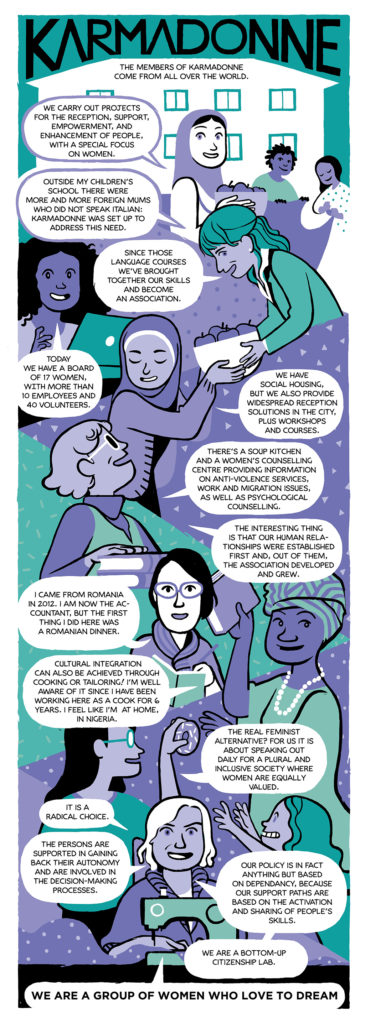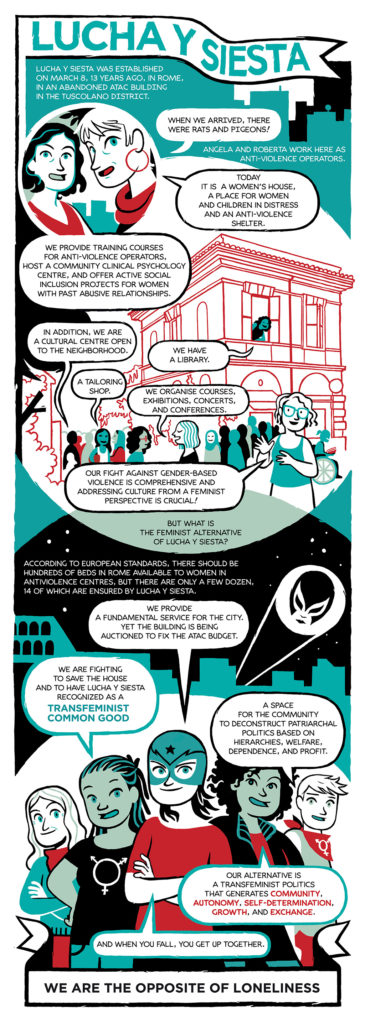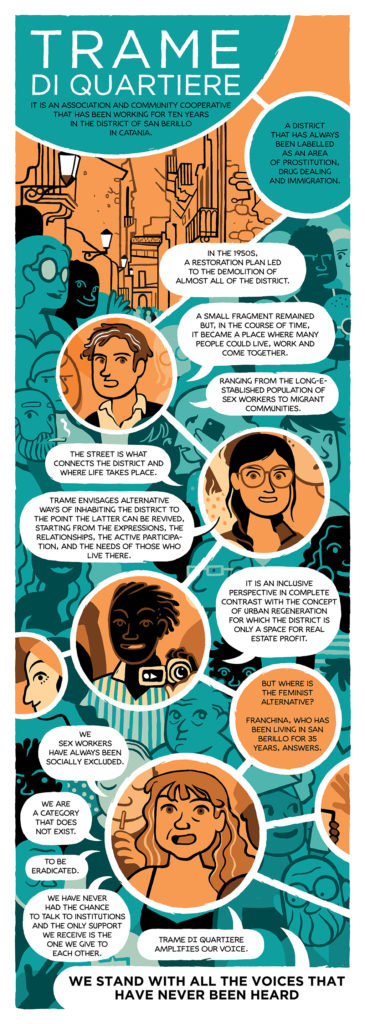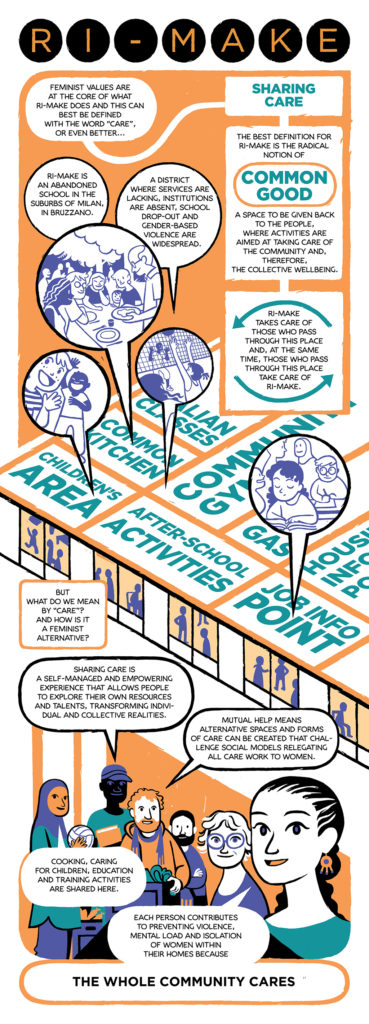

Five Practices for Feminist Cities and Public Spaces
Our vision at the Venice Biennale, where we are hosted by the Rebel Architette collective
- ActionAid
- Five Practices for Feminist Cities and Public Spaces
Feminist Public Spaces
What characteristics should a feminist city have?
The answer lies in Rita Petruccioli's illustrations on show at the Venice Architecture Biennale, where we are guests of the Rebel Architette Collective at the Italian Pavilion, open until 21 November 2021.
The installation “Sisterhood in the Neighbourhood. Detoxing Public Space from Patriarchy” presents five practices embodying innovative visions of power, relationships and communities, by building spaces for participation, inclusion and active citizenship.
Programma Cambia Terra (Arco Ionico), Ri-make (Milan), Lucha y Siesta (Rome), Trame di quartiere (Catania), and Karmadonne (Carmagnola) are the realities told by the protagonists, united by their ability to create feminist alternatives to living and (re)building cities.
The illustrations trace back the challenge to the structural causes of inequality that we have been pursuing for years alongside organisations and partners in Italy.
At the heart of our efforts is our feminist vision, which starts from a careful reading of the intersections of the different forms of oppression that affect people, especially women, with the aim of building inclusive communities that respect diversity.
Cambia terra (Arco ionico)
Invisible Labourers - Protagonists of Change
Cambia terra is the programme by which we promote the improvement of the living and working conditions of women employed in agriculture in the Apulia, Basilicata, and Calabria regions. It is a transformative action in the development models of agricultural and rural communities.
It promotes the representation and leadership of women employed in agriculture - both Italian and foreign - to build alternatives that improve their access to public services, through collaboration with third-sector organisations, trade unions, companies, and institutions.
It makes visible and fights multiple discrimination, gender inequalities, and forms of violence suffered by women employed in agriculture, by seeking to influence the political agenda and building multi-stakeholder alliances and networks.
Cambia Terra is a feminist alternative because it adopts an intersectional view to analyse a social issue not considered by social and sectoral policies and contributes to giving voice and representation to women who are largely invisible in the public sphere.
Click to enlarge >>
Karmadonne, Carmagnola
We Are a Group of Women who Love to Dream
Karmadonne is an association that uses active citizenship as a method to realise ideas, projects, and requests from many Italian and migrant women who share a common dream: bringing together differences, merging them, and creating a multicultural community of solidarity.
Casa Frisco, the association’s headquarters, is an open space, a place for meeting and exchange, which offers hospitality to those who are experiencing hardship.
It is a social housing project funded partly by the guests and partly by the partnership with local social services and the widespread extraordinary reception project for asylum seekers of the Prefecture of Turin. Casa Frisco offers social, psychological, and basic nursing support, as well as a soup kitchen, a social tailor’s shop, community workshops, and job and housing options.
Karmadonne is an experimental laboratory of a local multi-ethnic and solidarity reality, with a strong female connotation, a unique experience in the area, starting from the Board of Directors made up of 900 members coming from three different continents.
Women are the protagonists of the association, which they animate day after day with activities that enhance the stories and skills of each one of them.
<< Click to enlarge
Casa delle Donne Lucha y Siesta (Roma)
We Are the Opposite of Loneliness
On 8 March 2008, a group of women in Rome returned to the community a building owned by ATAC, the local public transport company, which had been abandoned for a long time and was inhabited only by rats and pigeons.
This is how Casa delle Donne Lucha y Siesta was born, a hybrid project that includes a shelter, a semi-independent housing and an antiviolence centre, which, to date, has welcomed more than 150 women, often with minors in their charge, and supported over 1,200 of them. It is characterised by a great ability to activate, catalyse and network people, groups, and associations. When the building was put up for sale by ATAC, Lucha set up the “Lucha alla città” (Lucha to the city) Committee and a crowdfunding campaign that, in a very short time, brought together many individuals and organisations to ensure that Lucha would continue to exist.
Lucha y Siesta is a feminist alternative because it is a reference point for women’s self-determination and for the fight against all forms of gender-based violence.
It challenges the dominant power dynamics, even in the management of public affairs, proposing a participatory process of discussion on the use of the space to create a new model of open and transfeminist common good.
Click to enlarge>>
Trame di Quartiere (Catania)
We Stand by All the Voices that Have Never Been Heard
Trame di Quartiere (TdQ) was founded in 2015 in Catania, and operates in the historic district of San Berillo, where it experiments practices of cultural innovation and urban regeneration through projects of reuse of spaces and social reactivation of those who live there. It is a heterogeneous association that brings together residents, researchers, and volunteer staff.
Known for centuries as a poor and infamous working-class district, in the 1950s San Berillo was the object of a speculative operation that dismembered its urban and social fabric, going down in history as the “gutting of San Berillo”. A large part of the district was demolished to make way for modern buildings, and the owners of the expropriated properties were transferred to the suburban district of Nesima, prompting the emergence of new social problems. The area that survived the demolition has become over time a refuge for the “invisible” and excluded people of the city: migrants, sex workers, and the homeless.
In 2017, TdQ recovered Palazzo De Gaetani, an abandoned historical building in the heart of the neighbourhood, transforming it into a public meeting place.
The social theatre and video-documentation workshops made it possible to collect, process and tell the stories linked to the neighbourhood in a performative and audiovisual way.
Trame di Quartiere is a feminist alternative because it values and seeks diversity, challenges power imbalances, and gives voice and representation to people, even the most excluded and marginalised.
<< Click to enlarge
Ri-Make (Milano)
For Us, Care is a Collective Act
Ri-Make is a “Space for Social Re-Appropriation, Self-Management and Conflictual Mutual Aid”.
It was founded in 2014 between Affori and Bruzzano, an area on the outskirts of Milan characterised by marginality, social hardship, low education level, and lack of public services and cultural offerings.
Among the services offered, “Non sei sola, non sei solo” (You are not alone) is the help desk that offers advice for work, income or home problems, solidarity babysitting services, and grocery shopping delivery. These activities are entirely free of charge and, during the Covid-19 health emergency, were the only support for many local people in need. With the outbreak of the pandemic, Ri-Make added new activities, such as solidarity shopping, distribution of tablets and PCs, and filling in forms for municipal shopping vouchers.
Ri-Make is a feminist alternative because it provides an attentive, conscious and collective reading of the imbalances of power, underscoring the problems felt and suffered by those who live in peripheral neighbourhoods, and attempting to build common redress tools. It puts care back at the centre as a collective act, in opposition to the dominant view based on unpaid or underpaid care work, considered marginal and delegated mostly to women.
Click to enlarge >>
